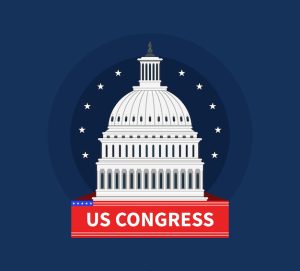Veterans Organizations Praise Agreement While Advocating for Disability Benefits System Improvements
By PVA National Staff
After the longest government shutdown in U.S. history, Congress has reached an agreement that secures substantial funding for veterans’ healthcare and benefits while temporarily funding much of the federal government through January 30, 2026.
Landmark VA Funding Secured
The continuing resolution, signed by the President, provides full-year funding for the Department of Veterans Affairs, delivering $122.3 billion for VA healthcare and $271 billion for benefits in fiscal year 2026. The package also includes $122.3 billion in advance appropriations for FY 2027, ensuring continuity of care for the nation’s veterans.
Key allocations include:
- Community Care: $38.7 billion to expand veterans’ access to private healthcare providers
- Mental Health and Suicide Prevention: $18.9 billion, with $3.7 billion dedicated specifically to suicide prevention efforts
- Women Veterans: $1.43 billion for specialized care and services
- Toxic Exposure Fund: $46.7 billion to address health conditions related to environmental exposures
- Adaptive Sports Programs: $16 million as part of $29.1 million for National Veterans Sports Programs
- Medical and Prosthetic Research: $945 million
- VA Electronic Health Record Modernization: $3.4 billion
The legislation also includes critical protections for veteran services, prohibiting reductions in staffing, hours of operation, or services at the Veterans Crisis Line, and requiring the VA to maintain adequate staffing levels for timely benefits claims processing and healthcare appointments.
Veterans Organizations Defend Disability Compensation System
As Congress secured funding, veterans service organizations engaged in crucial discussions about the future of VA disability benefits. Paralyzed Veterans of America (PVA) participated in roundtable discussions hosted by both Democratic and Republican members of the House Veterans’ Affairs Committee.
“Don’t blow it up, tune it up!” declared PVA National President Robert Thomas, Jr., during a November 5 roundtable led by Ranking Member Mark Takano (D-CA). President Thomas emphasized that being disabled is expensive and advocated for increases in special monthly compensation. He also highlighted that insufficient compensation and pension examinations create unnecessary churn in the system.
The discussions came amid unfair media attacks on disabled veterans receiving benefits. Veterans organizations, including PVA, VFW, DAV, the American Legion, and Wounded Warrior Project, presented a united front in defending the disability compensation system while acknowledging areas for improvement.
In a November 13 closed-door roundtable with the committee majority, PVA stressed the importance of having complex claims supported by medical evidence from VA providers. The organization also highlighted that many veterans have episodic disabilities that may not be appropriately reflected in traditional compensation and pension examinations.
Participating organizations agreed that while the VA could improve oversight of contract examinations and increase training, there is no need to overhaul the entire disability rating schedule.
Transportation Safety Remains Priority
PVA continues to advocate for the safety and accessibility rights of wheelchair users in transportation. In response to a Department of Transportation request for information, PVA submitted comprehensive comments outlining research needs for autonomous vehicle deployment.
The organization called for additional research ensuring AV technology can detect pedestrians using wheelchairs or scooters and respond appropriately to prevent fatalities. PVA also urged DOT to create a government and public database tracking traffic accidents involving pedestrians with mobility devices and to conduct research on wheelchair securement systems necessary for large-scale deployment of wheelchair-accessible AVs.
On the aviation front, DOT clarified that airlines remain responsible for repairing or replacing damaged wheelchairs and scooters, despite a temporary pause in enforcement of certain provisions from a December 2024 rule. Airlines must pay to repair or replace damaged mobility devices up to the original purchase price when the damage is the airline’s fault.
Senate Advances COLA Increase
In positive news for veterans, the Senate unanimously passed the Veterans’ Compensation Cost-of-Living Adjustment Act of 2025 on November 9. The legislation will increase VA disability compensation, clothing allowances, and dependency and indemnity compensation by 2.8 percent, effective December 1. The increase matches the Social Security cost-of-living adjustment and reflects current inflation rates. The bill now moves to the House of Representatives for consideration.
Examining Veteran Transition and Aging Services
The Senate Veterans’ Affairs Committee held a November 12 hearing examining programs nationwide that help servicemembers transition from military to civilian life. Chairman Jerry Moran (R-KS) emphasized that veterans are “significant assets to our country” and praised organizations working to meet veterans’ needs.
Separately, the Senate Special Committee on Aging held a hearing on November 5 examining the Older Americans Act, which funds programs and services helping older adults live independently. As the act comes up for reauthorization, veterans organizations are monitoring its progress, recognizing that aging veterans often rely on community resources funded through this legislation.
Ongoing Challenges and Opportunities
While Congress successfully ended the immediate funding crisis, the specter of another shutdown remains for parts of the government beyond January 30. Senate appropriators are preparing additional full-year funding bills for other federal agencies, with hopes of completing all appropriations before the current resolution expires.
Veterans and disability advocates continue to face emerging challenges, including state laws providing disability parking permits to expectant mothers. A federal lawsuit filed in Florida on October 27 alleges that such laws infringe on the rights of people with disabilities under the Americans with Disabilities Act. Similar legislation has been enacted or proposed in Illinois, Ohio, and other states.
How to Get Involved
Veterans and wheelchair users can participate in ongoing research through a project funded by the National Academies of Science, Engineering, and Medicine, focused on improving air travel experiences for wheelchair users. Eligible participants can complete a screening survey at travelX@iu.edu or by calling 812-855-9037.
For wheelchair or scooter users experiencing issues while flying, particularly damage to mobility devices or difficulties with aisle chair transfers, contact should be made with Danica Gonzalves, PVA Senior Advocacy Attorney, at DanicaG@PVA.org.
For more information on veterans’ benefits and disability rights advocacy, visit the House and Senate Veterans’ Affairs Committee webpages for information on previous and upcoming hearings and markups.

